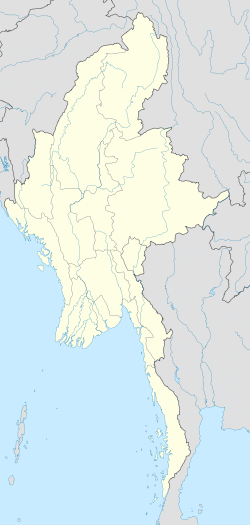Maungdaw
Maungdaw
မောင်တောမြို့ | |
|---|---|
Town | |
 A street in Maungdaw | |
| Coordinates: 20°49′N 92°22′E / 20.817°N 92.367°E | |
| Country | |
| Division | |
| District | Maungdaw District |
| Township | Maungdaw Township |
| Area | |
• Total | 582.92 sq mi (1,509.8 km2) |
| Elevation | 10 ft (3 m) |
| Population (2008)[1] | |
| • Ethnicities | 80% Rohingya |
| • Religions | Buddhism Islam Christianity Hinduism |
| Time zone | UTC+6:30 (MMT) |
| Climate | Am |
Maungdaw (Burmese: မောင်တောမြို့; MLCTS: maung:tau mrui., pronounced [máʊɰ̃dɔ́ mjo̰], Bengali: মংডু, romanized: Moṅḍu) is a town in Rakhine State, in the western part of Myanmar (Burma). It is the administrative seat of Maungdaw Township and Maungdaw District. Bordering Bangladesh, Maungdaw is home to one of 2 official border trade posts with Bangladesh.
Maungdaw is 16 miles (26 km) west of Buthidaung. The two towns are separated by the Mayu Mountains and are connected by two tunnels built in 1918. The district around Maungdaw is home to a large Rohingya population.

History
[edit]In August 2024, the civilians trying to flee the town from violence related to the Myanmar civil war were attacked by a drone strike.[2][3] The victims were predominantly Rohingya, and the number killed by the strike may total more than 150 or 200, with possibly 300 more injured.[2][3] A number of local Rohingya activists blamed the Arakan Army for the strike,[2][3] which the group denied, and blamed the government for.[3]
On 8 December 2024, the Arakan Army took complete control of Maungdaw and the Bangladesh–Myanmar border after capturing Border Guard Police Battalion No. 5, the junta’s last remaining stronghold in Maungdaw Township.[4]
Demographics
[edit]The majority of the populace, about 80%, are Rohingya people, while the remainder of the populace consists of other ethnic groups, including Rakhine, Bamar, Daingnet, and Mro.[citation needed]
Education
[edit]As of 2016, there are eight high schools, 10 middle schools, 16 post-primary schools and 125 primary schools.[5]
Economy
[edit]The official border trade post with Bangladeshi town of Teknaf opened on 5 September 1995.[6] In 2022, total trade volume at the border post stood at US$15.519 million.[7]
References
[edit]- ^ "Rohingyas are not citizens: Myanmar minister". The Hindu. 30 July 2012. Archived from the original on July 31, 2012. Retrieved 20 November 2018.
- ^ a b c Ratcliffe, Rebecca (2024-08-12). "Children among up to 200 Rohingya killed in Myanmar drone attack". The Guardian. ISSN 0261-3077. Retrieved 2024-08-13.
- ^ a b c d "Ethnic armed group suspected of deadly attack in Myanmar on Rohingya trying to flee fighting". AP News. 2024-08-10. Retrieved 2024-08-13.
- ^ "AA Takes Complete Control of Myanmar-Bangladesh Border After Seizing Maungdaw". The Irrawaddy. 9 December 2024.
- ^ Min Thein Aung (2016-11-01). "More Schools Reopen in Myanmar's Maungdaw Township". Radio Free Asia. Archived from the original on 2016-11-02. Retrieved 2016-10-15.
- ^ "Border Trade Posts". Ministry of Commerce. Retrieved 2023-03-05.
- ^ "Border Trade Data". Ministry of Commerce. 2023-02-24. Retrieved 2023-03-05.
External links
[edit]20°49′N 92°22′E / 20.817°N 92.367°E



